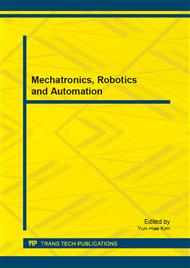p.1172
p.1178
p.1182
p.1188
p.1192
p.1196
p.1202
p.1208
p.1212
An Improved Discrete Particle Swarm Optimization for Berth Scheduling Problem
Abstract:
Berth scheduling operation is an important problem in container terminal. The mathematic model of this problem is described in this paper and an improved particle swarm optimization algorithm is introduced to obtain the optimal scheduling solution. A floating-point allocation rule is used to encode the particles in the discrete space. A local search method is combined with PSO to avoid precocity. Finally the experiments are done to prove the improved PSO in this paper can resolve the berth scheduling problem and get better solution and convergence speed than the basic PSO.
Info:
Periodical:
Pages:
1192-1195
Citation:
Online since:
August 2013
Authors:
Price:
Сopyright:
© 2013 Trans Tech Publications Ltd. All Rights Reserved
Share:
Citation:


